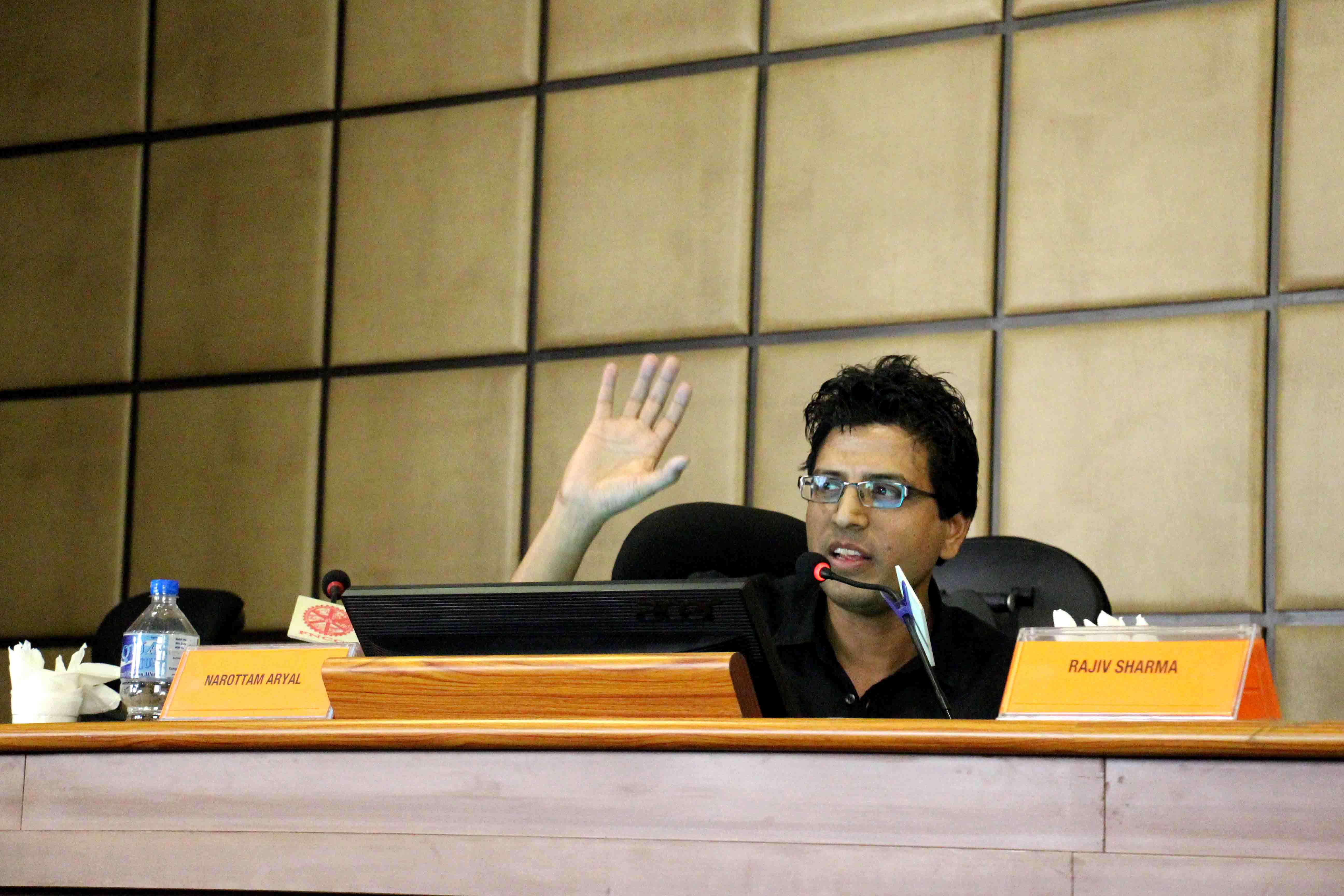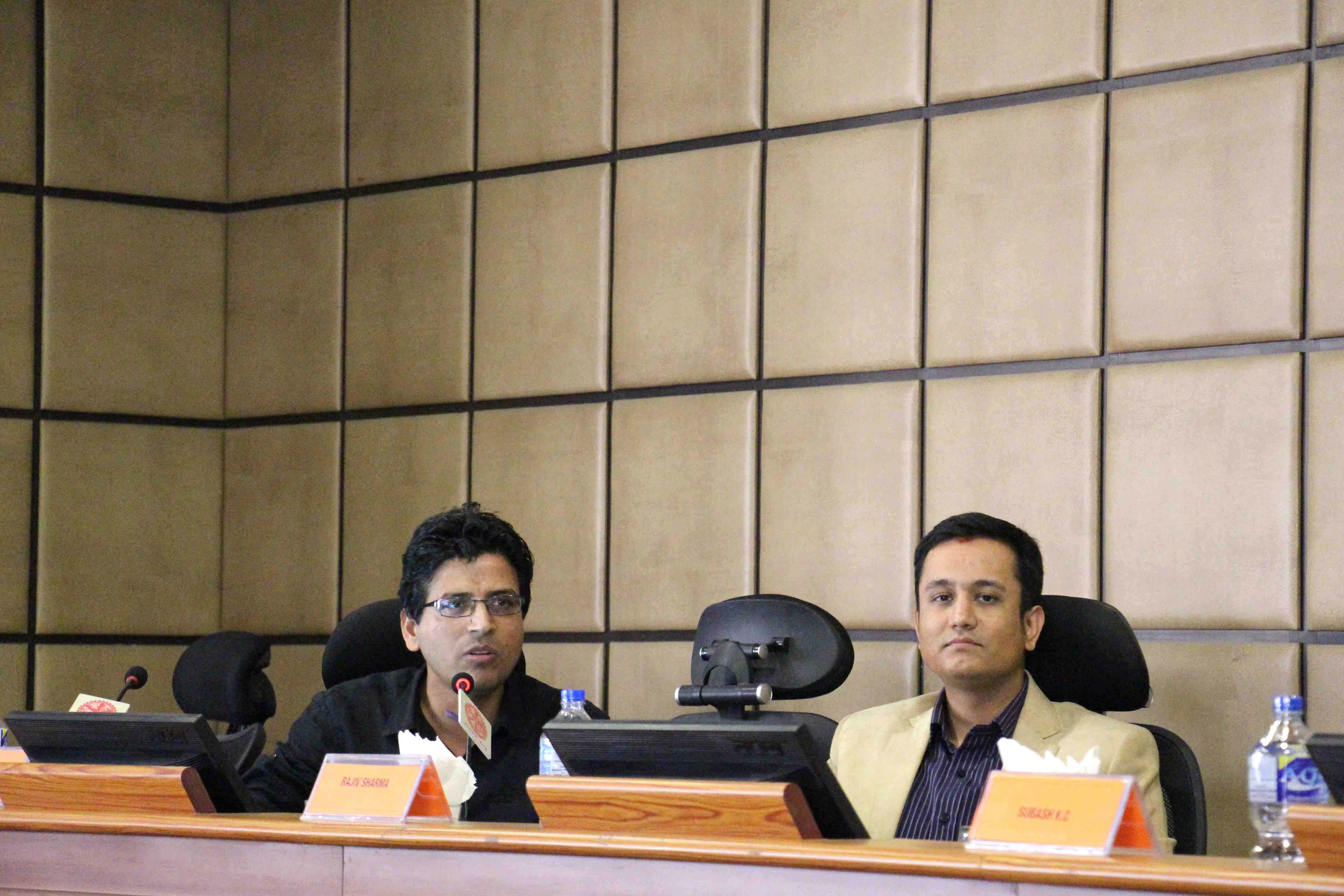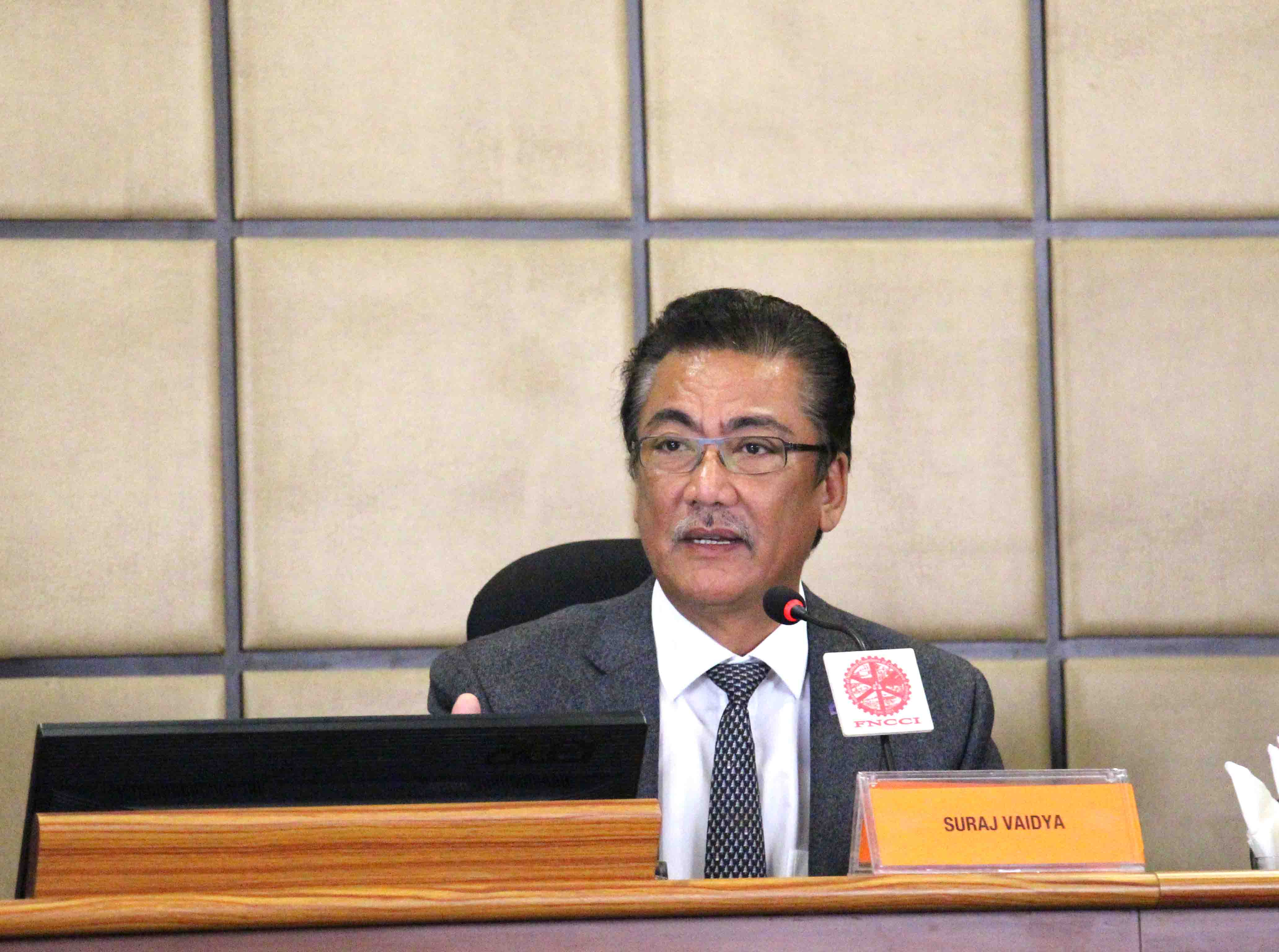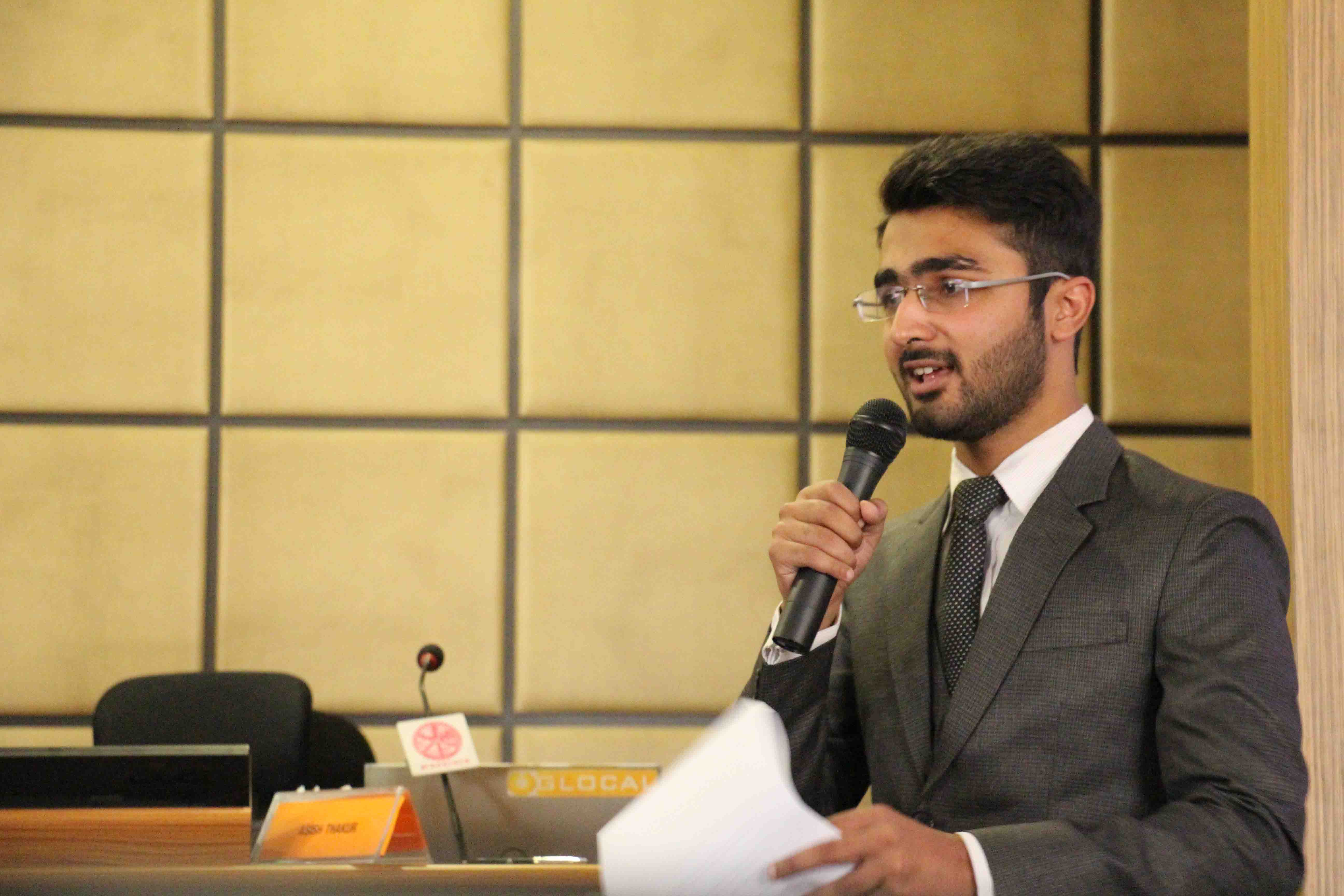In the programme held at the FNCCI Hall in Teku, the three prominent panel members had a lively conversation about the entrepreneurial culture in Nepal and shared the way forward for the business ecosystem development.
Kathmandu, November 14, 2016: As part of the first event among the series of programmes being conducted to celebrate Global Entrepreneurship Week 2016 in Nepal, Glocal Pvt. Ltd. today organized a panel discussion on ‘Dissecting the Nepalese Business Ecosystem’.
The programme incorporated panelists from various sectors ranging from entrepreneurs, young people to policy makers to have lively discussion, drawing applicable solutions in order to address issues of skill mismatch paradox and initiations. The panel comprising of Narottam Aryal, Executive Director, King’s College, Rajiv Sharma, Managing Director, Job Dynamics, and Suraj Vaidya, President, Vaidya’s Organization of Industries and Trading Houses was moderated by Mr. Asish Thakur, Executive Director of Glocal Pvt. Ltd.
Asish started the programme on a note by asking a question on where would the panelists see Nepali businesses in the span of 10 years. Replying to the question, Aryal expressed hope that, by then Nepali businesses will have a global reach and the brands originated from Nepal will become renowned names in the world market. Similarly, Rajiv Sharma said that businesses will become model organizations. Meanwhile, Suraj Vaidya expressed hope to see Nepal graduating to the next level with the country’s economic status rising with the growing investment in the business sector.
Challenges in Nepalese businesses
Talking about the challenges in Nepalese businesses, Sharma expressed dissatisfaction that employees are not taken as assets in companies. “People are not treated well, and not taken as an asset to create competitive advantage. Employees should be more like brand ambassadors of the company and products,” he said. “First mark in the interns will be like the first love. If they have very good experience as interns in the company, they will be very loyal customers of the business.”
Sharing how challenging it is to provide young and talented human resources to the businesses, Sharma said, “In earlier times, employers used to know what their employees wanted. But now, expectations are changing. People now not only want the salary, but want to bring change in the organizations.”
Speaking about the methodology of bridging the gap between work skills, education and employability, Narottam Aryal shared, “In Nepal, education has been defined with a culture of fixed set of curriculum, books, questions, pattern of answers, making notes, and writing exams, securing good grades, etc. Education is considered just the process of rote learning. But, we need to focus more on the heart of education and our faculties need to be prioritized. We should motivate them for a better outcome.”

Sharing about his experiences and problems in finding the right people for the right jobs, Vaidya said that business houses need to prepare for the possible outcomes. Then only will the problem of mismatch between the expectation of employers and what the employees can perform be resolved, he said.
“We take Nepal for granted. Our performance is not matching with what we have studied in universities abroad. We need to be more confident. The risk taking factor in Nepali youths is still much less. We need to improve more on this,” Vaidya said, adding, “There’s been a huge difference between the mindset of youths then and now. Young people now are willing to learn and explore something. In the past, whatever the seniors decided used to be considered right, but now the scenario is changing.”
Sharma, sharing about challenges in education, says that educational qualification and a degree doesn’t define what you are. It matters on what kind of value you can create. Why would the company subscribe your service. Education needs to prepare the students to make their hands dirty, he added.

“You have to fail to succeed, but you have to fail cheaply,” shared Aryal. “Explore as much as you can. In Nepal, success of an education institution is now measured on the basis of the visa granted to students not on the number of students starting businesses. Progressive education and community based education is a must to change the scenario.”
As the major business houses started small and gradually progressed to a present position, it’s sure for other businesses also to grow in a similar way. “If you fall, you need to get up and move forward. Don’t wait for people to come and help you. Don’t pity yourself,” said Vaidya.
If you fall, you need to get up and move forward. Don’t wait for people to come and help you. Don’t pity yourself. -Suraj Vaidya.

Role of Education to become a successful entrepreneur
Replying to a concern shared by Thakur about the necessity of training and education and also the increasing number of dropouts in the market, Sharma feels that college education is the best investment one can have. “In the college, You get to network and come up with some great business ideas leading to business venture. So, investing in yourself is a must,” said Sharma. He also raised a point that we need to make students more interested in study making it fun by teaching the concepts in a practical way.
“But, education is not necessarily required to be successful in business if education is just a certificate. We can present both sides of views on whether entrepreneurship be taught or not? If you have a very clear goal in your mind, education is not necessarily important. In the world, there are millions of successful entrepreneurs. Education is an asset and sometimes becomes liability. I agree with the quote “I was born intelligent but education ruined me.” We are killing creativity with the type of education we are providing. But, if it’s right education fitting the reality, then it of course will surely help,” shared Aryal.
Presenting a contrasting view, Vaidya highlighted about the necessity of education. “You are asked about your degree while applying for a job.” On a different note, Vaidya said, “There are so much of potential in Nepal. We need to appreciate Nepal first. But, I think we’re losing our touch with our own country. We need to appreciate what past people have done and move forward.”
Sharing his tips on becoming a successful entrepreneur, Narottam Aryal said, “We need to encourage youths to try something, and fail. We need to reform the school system. We are superficial to an extent that even without trying anything, we say nothing is possible here.
For student entrepreneurship
In Nepal, it is an ingrained culture that students become self-sufficient from the education imparted inside the college compound. A lot of colleges in Nepal discourage the students to go out of the college and explore the outside world. We learn more by doing instead of studying textbooks and taking lectures. In Nepal, we have used absolutely absurd methods. We need to question ourselves on where we are and what we should be doing.
Talking about the importance of intrapreneurship, Sharma shared that very less companies in Nepal run as enterprises. “People do not own the ideas about the works they are assigned for. Intrapreneurship makes people more accountable, making them to perform better. People these days are hungry to bring change and make an impact, not to make money.”

On the concern of Thakur to conclude the discussion with a note on possible collaboration between education and corporates and students having to learn from the consumer behaviours in the west, as we have not carried out case studies of Nepali businesses, and end up teaching them about western businesses, Glocal has started making cases of Nepali Business starting with Bajeko Sekuwa. Narottam Aryal said, “There are problems in the way we teach business in Nepal. No researches happen about Nepali businesses. We don’t know much about Nepal’s consumer behaviour. To create a win-win situation, business houses in Nepal should start to tie-up and collaborate with academia to conduct case studies. Only then will the business schools and corporates progress together.” Vaidya added to conclude the discussion with opportunities for the youth to come up with ideas to different business families in Nepal. He himself appealed the youth to come to him and work as partners.
Vaidya added to conclude the discussion with opportunities for the youth to come up with ideas to different business families in Nepal. He himself appealed the youth to come to him and work as partners.
By Basanta Kumar Dhakal







